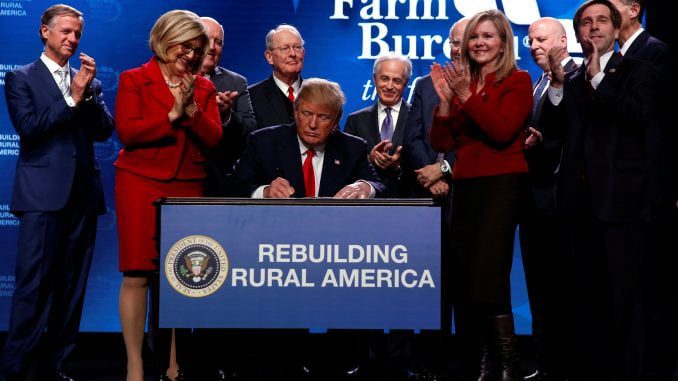
NASHVILLE, Tenn. — President Donald Trump on Monday announced his plan to boost the nation’s rural economies. Speaking at the 99th Annual Convention of the American Farm Bureau Federation, Trump announced the Task Force on Agriculture and Rural Prosperity, a multipronged effort to remove economic barriers and get money flowing in rural areas. Rural areas, including those in N.C., were key to Trump’s 2016 White House victory, voting for Trump nearly 3-to-1 over Democrat Hillary Clinton.
The trend came after years of what small town voters, often employed in agriculture, saw as trade deals and White House policy that triggered rural flight and hollowed out small towns across the country. Rural Americans make up about 20 percent of the population, but in the 2016 elections, they were 17 percent of the voter turnout. These rural voters are expected to play increasingly pivotal roles in the 2018 and 2020 elections.
As part of the effort to bolster rural economies, Trump signed an executive order Monday to make it easier for the private sector to locate broadband infrastructure on federal land and buildings, part of a push to expand high-speed internet in rural America.
Faster internet speeds in rural areas have long been seen as key to addressing the economic divide between rural and urban America, but the costs have so far been prohibitive.
Expanding broadband has been a priority in N.C. where nearly fifteen percent of the population has access to less than 1 gigabyte of broadband. Under former Gov. Pat McCrory connecting every N.C. school to broadband was a high priority, and now 98 percent of K-12 schools across the state have broadband. Still, N.C. ranks the tenth most populated state, but the fifteenth most connected.
Nationwide, about 39 percent of rural areas lack access to high-speed internet service, the Federal Communications Commission said in a 2016 report. The president’s speech outlined the findings of the Rural Prosperity Task Force report.
“The task force also focused on the need to rebuild our crumbling rural infrastructure,” said Trump. “We’ve already slashed harmful restrictions that delayed critical infrastructure projects for decades and decades. Hard to believe. And we are proposing infrastructure reforms to ensure that our rural communities have access to the best roadways, railways and waterways anywhere in the world.”
In the speech, the president also told farmers that he supports crop insurance, signaling a possible shift from his proposals last year to shrink a program that many farmers rely on for funding their operations.
Trump said Congress would include the subsidies for crop insurance premiums in the upcoming “farm bill” that directs billions of dollars each year to agriculture, nutrition, food and land-conservation programs.
“I’m looking forward to working with Congress to pass the farm bill on time so that it delivers for all of you and I support a bill that includes crop insurance,” Trump said after noting Senate Agriculture Committee Chairman Pat Roberts was in attendance. “We’re working hard on the farm bill and I think it’s going to go well.”
In May, Trump angered farm groups, which represent the rural voters who generally support his Republican Party, when he proposed cutting $46.54 billion in federal agricultural funding, mostly by capping the amount the government chips in toward crop insurance.
However, in the speech Monday he got a standing ovation and chants of “USA! USA!” from the room of agriculture professionals when he talked about the recently passed tax cut bill that caps the estate tax.
“From now on, most family farms and small-business owners will be spared … the deeply unfair estate tax, known as the death tax — so you can keep your farms in the family,” Trump said. “Obviously, you love your families; otherwise, you wouldn’t be standing for that one.”
Last year, Trump hired N.C. native and former longtime Sen. Thom Tillis staffer Ray Starling as a White House senior adviser on agriculture trade. From a farm family in Autryville, Starling has advocated for rural economies on the staff at the General Assembly and the White House.
“President Trump showed he was serious about agriculture having a seat at the table when he hired Ray Starling, my former chief of staff, to advise him on agriculture policy,” said Tillis (R-N.C.). “His speech today announcing broadband recommendations of the Rural Prosperity Task Force to help rural America thrive and overcome the challenges they face reaffirms his commitment to our agricultural community.”
After the speech, Trump signed the two executive orders to improve rural broadband access.
“We need to get rural America more connected. We need it for our tractors, we need it for our schools, we need it for our home-based businesses,” a White House official told reporters ahead of Trump’s speech.
The White House described the moves as an incremental step to help spur private development while the administration figures out how it can help with funding, something that could become part of Trump’s plan to invest in infrastructure.



